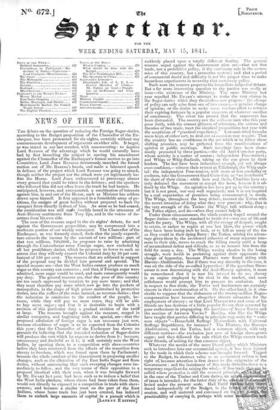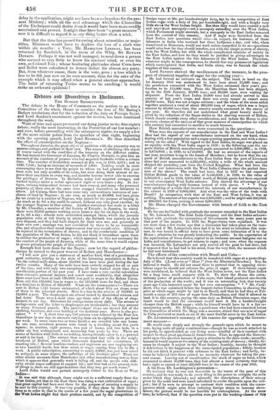NEWS OF THE WEEK.
THE debate on the question of reducing the Foreign Sugar-duties, according to the Budget proposition of the Chancellor of the Ex- chequer, has been protracted for six nights, certainly without any commensurate development of arguments on either side. It began, as was stated in our last number, with manceuvering : to deprive Lord SANDON of the advantage which he would naturally have had by first broaching the subject in moving his amendment against the Chancellor of the Exchequer's formal motion to go into Committee, Lord JOHN RUSSELL dexterously snatched the formal motion out of Mr. BARING'S hands, and made a laboured speech in defence of the project which Lord SANDON was going to attack, though neither the project nor the attack were yet legitimately be- fore the House. Lord Jona endeavoured to preoccupy almost every ground that could be taken in the defence ; and the speakers who followed him did not often leave the track he had beaten. He anticipated, however, and encountered, a combination of interests against him, in and out of the House, such as Minister has seldom drawn upon himself. It first appeared in a formidable array of pe- titions, the ensigns of great bodies without prepared to back the tompact force directly in front of him. As soon as he had ceased, the combination was still ni911e forcibly heard in the utterance of Anti-Slavery sentiments from Tory lips, and in the voices of de- serters from his own side.
The sum of the reasons urged in the six nights' debate, for and against the Government proposition, may be compressed into a moderate portion of our weekly retrospect. The Chancellor of the Exchequer, as was formerly stated, finds that the yearly expendi- ture exceeds the income by the amount of two millions : part of that two millions, 700,0001., he proposes to raise by admitting through the Customhouse some Foreign sugar, now excluded by all but prohibitory duties, which he proposes to lower to such an extent that they will only exceed the Colonial duty by 50 per cent. instead of 150 per cent. The reasons that are adduced in support of the proposal may be divided into general and special. The special reasons are—that the West Indies cannot produce so much sugar as this country can consume ; and that, if Foreign sugar were admitted, more sugar would be used, and more consequently would pay duty. The general reasons are, that the poor of this country are too much oppressed by taxation to pay more taxes; and that they must therefore pay some which now go into the pockets of monopolists, in the shape of high prices maintained by protective duties, into the coffers of the state instead, as revenue-duties ; that the reduction is conducive to the comfort of the people, be- cause, while they will pay no more taxes, they will be able to buy more sugar ; and that it is desirable to begin with a revision of this particular duty a gradual revision of the tariff at large. The reasons brought against the measure, ranged in similar categories, and beginning with the special, are—that the proposed admission of foreign sugar is not necessary just now, because abundance of sugar is to be expected from the Colonies this year ; that the Chancellor of the Exchequer has shown no grounds for believing that the intended reduction of Sugar-duties will produce the sum which be expects to derive from it ; because, unnecessary and doubtful as it is, it will certainly ruin the West Indies, by opening them to a competition with slave-countries before they have recovered from the effects of the transition from slavery to freedom, which was forced upon them by Parliament ; because the whole conduct of the Government in proposing smaller changes, such as the alteration of the East India Sugar and Rum duties, without announcing that such sweeping changes were im- mediately to follow, and the very terms of their opposition to a proposal identical with their own, when it was brought forward by Mr. EWART last year, had been such as to induce a belief that the West India planters, whose slaves had been taken from them, would not directly be exposed to a competition in trade with slave- owners ; and because a similar trust on the part of the East Indians, whose home trade has just been created, has induced them to embark large amounts of capital in a pursuit which is
suddenly placed upon a totally different footing. The general reasons urged against the Government plan arc—that not free trade, nor a prohibitive policy, is the customary rule in the econo- mics of this country, but a protective system ; and that a period of commercial doubt and difficulty is not the proper time to make hazardous experiments in reversing that customary policy.
Such were the reasons proper to the immediate subject of debate. But a far more interesting question to the parties was really at issue—the existence of the Ministry. The same Ministry last year repelled Mr. EWART'S attempt to make the very change in the Sugar-duties which they themselves now propose : the change of policy can only arise from one of two causes —a genuine change of opinion; or the desire to make some random effort to retrieve their expiring fortunes by a popular measure, at whatever sacrifice of consistency. The event has proved that the manoeuvre has been distrusted. The country saw the selfsame men who this year pour forth, with the utmost glibness of utterance, the axioms and theories of free trade, meet the identical propositions last year with the scepticism of "practical expediency." Cut-and-dried formula' seem kept, of either sort, to deal out as occasion may require. That the country has no confidence in the act which is to follow these shifting promises, may be gathered from the manifestations of opinion at public meetings. Such meetings' have been abun- dantly promoted by three parties,—the old Anti-Corn-law party, whose activity is a matter of course; independent Free-traders ; and Whigs or Whig-Radicals, taking. up the cue given by their leaders. The last have been industrious enough, yet not always over-confident,— witness their retreat at Edinburgh, the Whig cap.- tal : the independent Free-traders, with more or less cordiality or coolness, take the Government fixed Corn-duty as " an instalment" far short of their claim : while here and there, Chartists have ut- terly defeated the movement to accept the boon, because it is of- fered by the Whigs. An agitation has been got up iu the country ; i but it is not great, nor very well organized; and it is not inspired. by a real expectation of promises being consummated in deeds. The Whigs, throughout the long debate, taunted the Tories with the secret intention of doing what they now prevent : why, that is the very strength of the Tories : the Whigs talk without doing ; the Tories object, and do—when they cannot help it. Under these circumstances, the whole contest waged around the Sugar-duties—the mere standard to battle for—was one of life and death for party. The Whigs, with all_the energy of despair, sought to retain, or rather to regain at one last blow, the power which they have been losing inch by inch, or to kill as many of the foe as they could in their dying flurry : the Tories; seizing the advan- tage given them by the accidental adhesion of many separate inte- rests to their side, strove to crush the falling enemy amid a heap of accumulated defeat and ridicule, so as to remove him from the field for many a day. The Whigs, waxing abusive in the losing struggle, were lavish in preferring against their opponents the charge of hypocrisy, because Planters were found siding with Slavery-Abolitionists. But if there was any sincerity in the case, it was on the side of the so-called hypocrites : if the quondam Slave- owner is now fraternizing with the Anti-Slavery agitator, it must be remembered that it is now his interest to do so ; slavery is an engine employed by his rival in the market, and mere selfishness would prompt him to procure its exclusion. And in respect to free trade, the Tories and landowners are certainly sincere in their condemnation of it. On the other hand, is it cha- ritable to suppose that the disbursers of the twenty-million Negro- compensation have become altogether sincere advocates for the employment of slavery ; or that Lord MELBOURNE and some of his friends are less desirous of a little popular favour, than actuated by pure enthusiasm in propagating the doctrines of An SMITH and the maxims of ARTHUR YOUNG ? Besides, who like the Whigs have taught that parties differing in principle may unite for " com- mon objects "—Household Suffrage Monarchists with Universal Suffrage Republicans, for instance? The Planters, the Slavery- Abolitionists, and the Tories, had a common object, with very different motives—the exclusion just now of foreign slave-grown sugar; and they followed the rule which the Whigs cannot teach their friends, of uniting for that common object.
Whatever the merits of the more liberal policy which Ministers seek to introduce into our commercial system, it has been injured by the mode in which their scheme was brought forward. Tagged to the Budget, its abstract value as an economical reform is lost sight of, because attention is first drawn to the exigencies of the Government : and the instalment of free trade dwindles down to a
temporary expedient for raising the wind,—if free trade t be called where protection is still the avowed principle in the case of the Timber and Corn duties, an act of taxes is intended ; for the latter duty of 8s. ees levied under the present scale. Had Tariff duced independently of the Budget, in the le session, and well matured and canvassed on it practicability of carrying it, perhaps with some
delay in the application, might not have been so hopeless for the pre- sent Ministry ; while all the real advantage which the Chancellor of the Exchequer could derive from it would have been more readily ascertained and proved. It might thus have been "a great measure": now it is difficult to regard it as any thing better than a trick.



























 Previous page
Previous page